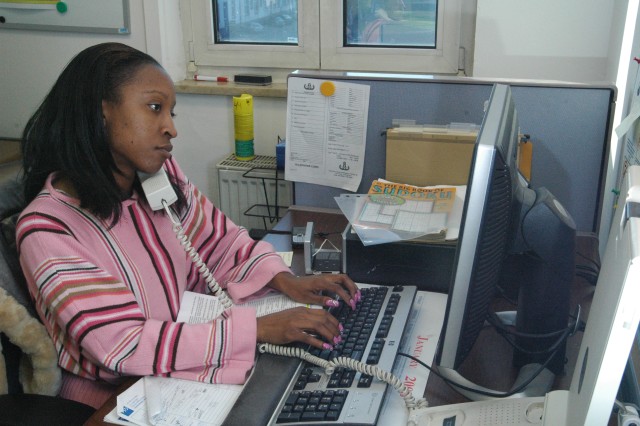HEIDELBERG, Germany - As a supply clerk, then Spc. Christina Harvey, couldn't have forseen the path her career would take after falling down a set of stairs while carrying unit supplies in September 2006.
After two years, Harvey, who is from Sacramento, Calif., found herself medically discharged from the Army and without a job, but less than two weeks later, she was back on the government payroll.
Hired under the Veterans Employment Opportunity Act, Harvey is now an administrative support technician for the U.S. Army Garrison Heidelberg Directorate of Plans, Training, Mobilization and Security.
She credits her Warrior Transition Unit platoon leader with immediately encouraging her to apply for federal employment and build her resume.
When Harvey fell down the stairs, she broke her ankle and wore a cast for the next four months. After her medical profile was lifted, she began to rebuild her run but experienced a lot of pain, she said.
After an MRI, doctors at the Heidelberg Health Center, found several torn ligaments, and she was referred to physical therapy.
With no improvement in her pain levels, her primary doctor told her there was nothing more he could do.
In March 2008, her unit, the 69th Transportation Company, chose to put her before a medical evaluation board, which chose to separate her.
Harvey transferred to the WTU in Mannheim, where she was immediately counseled and pushed to get ready for the civilian job market.
"(The WTU) was relaxing, but they push you to get ready to get out," Harvey said.
She applied for 10-15 jobs in the area, because her husband works as an air traffic controller at Coleman Army Airfield.
The solicitation for the DPTMS position closed in June, and she was called for an interview in July or August.
Now that she's on the job, she says she loves it. "(My coworkers) make me feel like I'm at home," Harvey said. "They make sure I'm okay, but I don't want them to worry about my handicap."
Today, Harvey wears an ankle brace daily, and has good days and painful days. She still goes to physical therapy but generally doesn't have a problem getting to her office on the top floor.
"I know if push came to shove, they would work with me and let me work on the bottom floor," she said.
Harvey is guaranteed reasonable accommodation for her disabilities by law, according to Mary Cooler, Equal Employment Opportunity specialist for USAG Baden-WAfA1/4rttemberg. "Reasonable accommodation is by executive order, and we don't have a choice," she said.
Harvey belongs to a growing pool of talented workers the Army cannot afford to overlook - the disabled.
"Corporate America understands the value of disabled workers, and they actively pursue them," Cooler said.
In the government, despite the American Disabilities Act, many managers are hesitant to hire someone who is disabled, said Whyte Eguakun, the chairman of the USAG Heidelberg EEO Special Emphasis Program.
In exit interviews across the Army, when someone is leaving federal service, they report they are leaving because there aren't enough people who 'look like me,' Cooler said, whether that means race, gender, or disability.
"We have got to do better," she said.
The USAG Baden-WAfA1/4rttemberg EEO office has a goal of recruiting and retaining at least a 2 percent disabled work force.
The pool of disabled potential employees continues to grow as a result of the war on terror. These military-minded individuals with "bright minds can be brought into federal service," Eguakun said.
"We have a community of individuals who served us well, and we want to serve them well," Cooler said.
Harvey said that is why she thinks she got the job.
"They knew I have that military mentality," she said. "I'm not a trouble maker, and I can pick things up quickly."
With the current workforce getting older, Eguakun said there is a growing competition for quality employees.
The EEO office has training available to help managers in their selection and interview processes and can help them make accommodations for disabled employees, often at little to no cost to the organization.
"One thing we have found is that people with disabilities are not identifying themselves," said Bonnie Ballard, USAG Baden-WAfA1/4rttemberg Equal Employment Opportunity Officer. "We only find out when something negative happens that prevents them from doing their work ... It doesn't take much to accommodate someone."
"There is often nothing wrong with a (disabled) person's mind," Ballard said. With the celebration of National Disability Employment Awareness month throughout October, she said they were trying to raise awareness.
Afterall, she said, "There is a thin line between able-bodied and disabled."
(Editor's Note: Jason Austin writes for the USAG Baden-Wuerttemberg newspaper, the Herald Post.)




Social Sharing